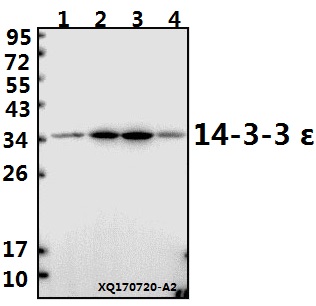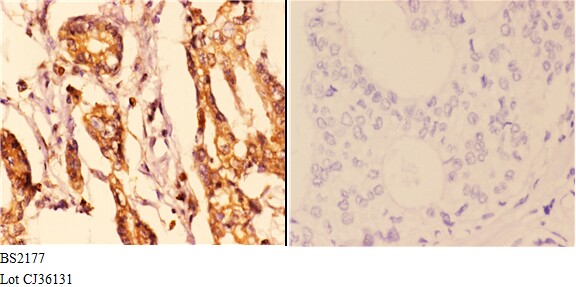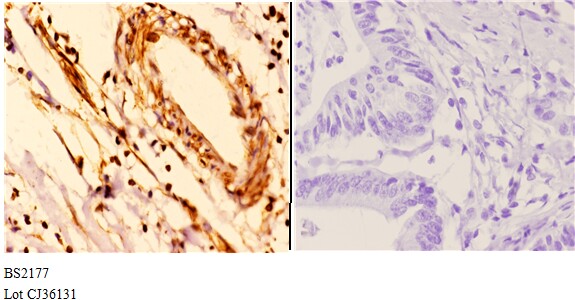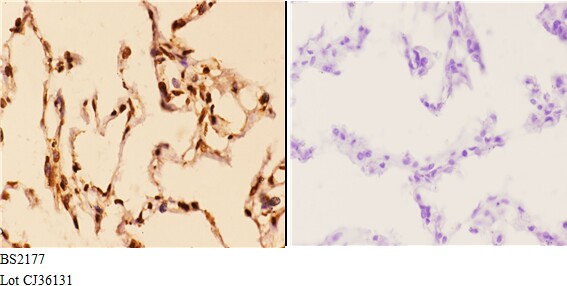Product Name :
14-3-3 ε (D238) polyclonal antibody Background :
14-3-3 proteins regulate many cellular processes relevant to cancer biology, notably apoptosis, mitogenic signaling and cell-cycle checkpoints. Seven isoforms comprise this family of signaling intermediates, denoted 14-3-3 β, γ, ε, ζ, η, θ and σ. 14-3-3 proteins form dimers that present two binding sites for ligand proteins, thereby bringing together two proteins that may not otherwise associate. These ligands largely share a 14-3-3 consensus binding motif and exhibit serine/threonine phosphorylation. 14-3-3 proteins function in broad regulation of these ligand proteins, by cytoplasmic sequestration, occupation of interaction domains and import/export sequences, prevention of degradation, activation/repression of enzymatic activity and facilitation of protein modification, and thus loss of expression contributes to a vast array of pathogenic cellular activities. Product :
Rabbit IgG, 1mg/ml in PBS with 0.02% sodium azide, 50% glycerol, pH7.2 Storage&Stability :
Store at 4°C short term. Aliquot and store at -20°C long term. Avoid freeze-thaw cycles. Specificity :
14-3-3 ε (D238) polyclonal antibody detects endogenous levels of 14-3-3 ε protein. Immunogen :
Synthetic peptide, corresponding to amino acids 200-250 of Human 14-3-3 ε. Conjugate :
Unconjugated Modification :
Unmodification
14-3-3 ε (D238) polyclonal antibody Background :
14-3-3 proteins regulate many cellular processes relevant to cancer biology, notably apoptosis, mitogenic signaling and cell-cycle checkpoints. Seven isoforms comprise this family of signaling intermediates, denoted 14-3-3 β, γ, ε, ζ, η, θ and σ. 14-3-3 proteins form dimers that present two binding sites for ligand proteins, thereby bringing together two proteins that may not otherwise associate. These ligands largely share a 14-3-3 consensus binding motif and exhibit serine/threonine phosphorylation. 14-3-3 proteins function in broad regulation of these ligand proteins, by cytoplasmic sequestration, occupation of interaction domains and import/export sequences, prevention of degradation, activation/repression of enzymatic activity and facilitation of protein modification, and thus loss of expression contributes to a vast array of pathogenic cellular activities. Product :
Rabbit IgG, 1mg/ml in PBS with 0.02% sodium azide, 50% glycerol, pH7.2 Storage&Stability :
Store at 4°C short term. Aliquot and store at -20°C long term. Avoid freeze-thaw cycles. Specificity :
14-3-3 ε (D238) polyclonal antibody detects endogenous levels of 14-3-3 ε protein. Immunogen :
Synthetic peptide, corresponding to amino acids 200-250 of Human 14-3-3 ε. Conjugate :
Unconjugated Modification :
Unmodification
-
 Western blot (WB) analysis of 14-3-3 ε (D238) pAb at 1:500 dilution Lane1:3T3-L1 whole cell lysate(40ug) Lane2:PC12 whole cell lysate(40ug) Lane3:HEK293T whole cell lysate(40ug) Lane4:A2780 whole cell lysate(40ug)
Western blot (WB) analysis of 14-3-3 ε (D238) pAb at 1:500 dilution Lane1:3T3-L1 whole cell lysate(40ug) Lane2:PC12 whole cell lysate(40ug) Lane3:HEK293T whole cell lysate(40ug) Lane4:A2780 whole cell lysate(40ug) -
 Immunohistochemistry (IHC) analyzes of 14-3-3 ε (D238) pAb in paraffin-embedded human breast carcinoma tissue at 1:50,showing cytoplasmic and nuclear staining.Negative control (the right)Using PBS instead of primary antibody, secondary antibody is Goat Anti-Rabbit IgG-biotin followed by avidin-peroxidase.
Immunohistochemistry (IHC) analyzes of 14-3-3 ε (D238) pAb in paraffin-embedded human breast carcinoma tissue at 1:50,showing cytoplasmic and nuclear staining.Negative control (the right)Using PBS instead of primary antibody, secondary antibody is Goat Anti-Rabbit IgG-biotin followed by avidin-peroxidase. -
 Immunohistochemistry (IHC) analyzes of 14-3-3 ε (D238) pAb in paraffin-embedded human breast carcinoma tissue at 1:50,showing cytoplasmic and nuclear staining.Negative control (the right)Using PBS instead of primary antibody, secondary antibody is Goat Anti-Rabbit IgG-biotin followed by avidin-peroxidase.
Immunohistochemistry (IHC) analyzes of 14-3-3 ε (D238) pAb in paraffin-embedded human breast carcinoma tissue at 1:50,showing cytoplasmic and nuclear staining.Negative control (the right)Using PBS instead of primary antibody, secondary antibody is Goat Anti-Rabbit IgG-biotin followed by avidin-peroxidase. -
 Immunohistochemistry (IHC) analyzes of 14-3-3 ε (D238) pAb in paraffin-embedded human breast carcinoma tissue at 1:50,showing cytoplasmic and nuclear staining.Negative control (the right)Using PBS instead of primary antibody, secondary antibody is Goat Anti-Rabbit IgG-biotin followed by avidin-peroxidase.
Immunohistochemistry (IHC) analyzes of 14-3-3 ε (D238) pAb in paraffin-embedded human breast carcinoma tissue at 1:50,showing cytoplasmic and nuclear staining.Negative control (the right)Using PBS instead of primary antibody, secondary antibody is Goat Anti-Rabbit IgG-biotin followed by avidin-peroxidase.
Helicobacter pylori infection combined with DENA revealed altered expression of p53 and 14-3-3 isoforms in Gulo−/− mice
PMCID: Pubmed No.:24035909
Proteomic analysis of differentially expressed proteins in Vitamin C-treated AGS cells.
PMCID: Pubmed No.:24067024
Proteomic Analysis of Cellular Response Induced by Multi-Walled Carbon Nanotubes Exposure in A549 Cells
PMCID: Pubmed No.:24454774
Changes in the proteomic profile during the differential polarization status of the human monocyte‐derived macrophage THP‐1 cell line
PMCID: Pubmed No.:25411139
Changes in the proteomic profile during the differential polarization status of the human monocyte‐derived macrophage THP‐1 cell line
PMCID: Pubmed No.:25411139
Proteomic analysis of differentially expressed proteins in Vitamin C-treated AGS cells.
PMCID: Pubmed No.:24067024
Proteomic Analysis of Cellular Response Induced by Multi-Walled Carbon Nanotubes Exposure in A549 Cells
PMCID: Pubmed No.:24454774
Bioworld Biotech only provide peptides for our antibodies and do not provide additional peptide customization services.
Price/Size :
USD 368/1mg/vial
Tips:
For phospho antibody, we provide phospho peptide(0.5mg) and non-phospho peptide(0.5mg).Describe :
Blocking peptides are peptides that bind specifically to the target antibody and block antibody binding. These peptide usually contains the epitope recognized by the antibody. Antibodies bound to the blocking peptide no longer bind to the epitope on the target protein. This mechanism is useful when non-specific binding is an issue, for example, in Western blotting (WB) and Immunohistochemistry (IHC). By comparing the staining from the blocked antibody versus the antibody alone, one can see which staining is specific; Specific binding will be absent from the western blot or IHC performed with the neutralized antibody.Formula:
Synthetic peptide was lyophilized with 100% acetonitrile and is supplied as a powder. Reconstitute with 0.1 ml DI water for a final concentration of 10 mg/ml.The purity is >90%,tested by HPLC and MS.
Storage:
The freeze-dried powder is more stable. For short time at 2-8°C. For long term storage store at -20°C.
Note :
This product is for research use only (RUO only). Not for use in diagnostic or therapeutic procedures.
 14-3-3 ε (D238) polyclonal antibody
14-3-3 ε (D238) polyclonal antibody  Datasheet
Datasheet COA
COA MSDS
MSDS SHIP
SHIP